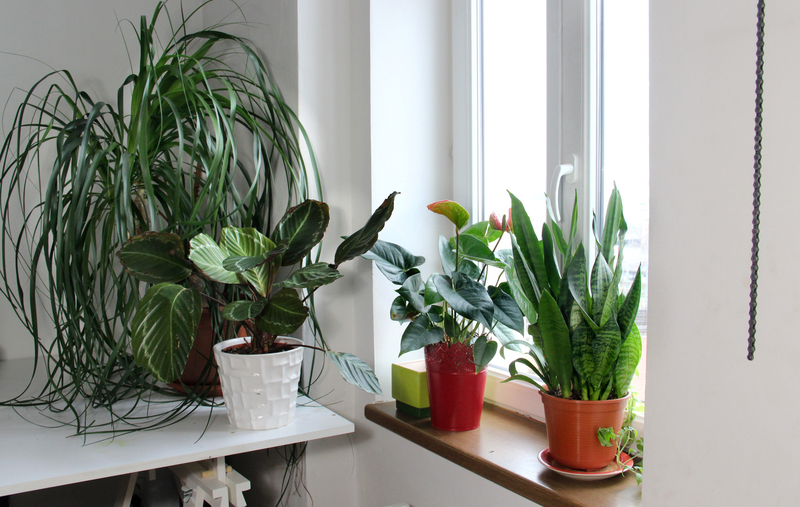Grow Your Knowledge with These 9 Essential Gardening Tips
Posted on 11/09/2025
Grow Your Knowledge with These 9 Essential Gardening Tips
Gardening isn't just about planting seeds and hoping for the best. Whether you're new to the hobby or looking to refine your skills, mastering a few essential gardening tips can truly elevate your outdoor space. In this comprehensive guide, you'll explore key gardening tricks and sustainable practices that help gardens--of all sizes--thrive. So, get your gloves ready and grow your knowledge with these 9 must-know gardening insights!
1. Understand Your Soil for Gardening Success
Soil is the foundation of every successful garden. Knowing your soil type determines what thrives in your landscape.
How to Test and Improve Your Soil
- Texture Test: Grab a handful of moist soil, roll it into a ball, and squeeze. If it crumbles, you likely have sandy soil. If it holds shape, it might be clay.
- pH Test: Most plants prefer slightly acidic to neutral soil (pH 6.0-7.0). Use a simple home soil test kit to check pH levels.
- Enriching the Soil: Add organic matter like compost, leaf mold, or well-rotted manure to supply nutrients and improve structure.
Rich, healthy soil leads to robust plant growth. Regularly mulching and rotating crops can further keep your soil fertile and vibrant.

2. Master Watering Techniques
Efficient watering is at the heart of every flourishing garden. Too little or too much can stress your plants, so it's crucial to learn the right techniques.
Smart Ways to Water Your Garden
- Morning Routine: Water in the early morning to minimize evaporation and prevent disease.
- Deep, Infrequent Watering: Instead of daily shallow watering, aim for fewer, deeper soakings to encourage roots to dive deep.
- Drip Irrigation: Consider installing a drip irrigation system for precise water delivery directly to roots.
Remember, different plants have different water needs. Group together plants with similar requirements for the most efficient irrigation.
3. Choose the Right Plants for Your Region
Not all plants are created equal when it comes to climate. One of the essential gardening tips is to select varieties suited for your local environment.
How to Pick the Best Plants for Your Garden
- Check Hardiness Zones: Use the USDA Plant Hardiness Zone Map or its equivalent to select plants compatible with your region's winter lows.
- Native Plants: Native species are generally easier to grow, support local wildlife, and require less maintenance.
- Seasonal Rotation: Rotate annuals and perennials based on season for year-round beauty and productivity.
Observing what thrives in gardens nearby can offer valuable clues for your own plant selection.
4. Embrace Mulching for Healthier Gardens
Mulching is more than just an aesthetic addition--it's a vital technique in your gardening toolkit.
The Benefits of Mulching
- Moisture Retention: Helps keep soil moist, reducing watering frequency and plant stress.
- Weed Suppression: Prevents light from reaching weed seeds, making it harder for them to grow.
- Temperature Regulation: Insulates plant roots from extreme heat and cold.
- Soil Enrichment: As organic mulches break down, they enrich the soil further.
Use materials like wood chips, straw, or compost for best results--your plants will thank you!
5. Prune with Purpose
Effective pruning can make the difference between a thriving garden and a tangled mess. This form of plant maintenance encourages new growth, removes diseases, and shapes your garden beautifully.
Best Practices for Pruning
- Right Tools: Use sharp, clean tools to avoid infecting your plants.
- Timing: Prune right after flowering for spring-bloomers; late winter is ideal for most shrubs and trees.
- Technique: Cut at a 45-degree angle above a bud facing outward from the plant's center.
Pruning can seem daunting at first, but with a little practice, you'll soon grow your gardening skill and confidence.
6. Feed Your Plants Properly
Just like people, plants need food to grow. Understanding plant nutrition is an essential step in effective gardening.
Choosing the Right Fertilizer
- Organic Options: Compost, bone meal, and fish emulsion offer long-term soil health benefits.
- Balanced Feeds: Look for N-P-K values (Nitrogen-Phosphorus-Potassium) that match your plants' needs.
- Application: Water thoroughly before and after feeding, and follow package directions to avoid over-fertilizing.
Regular, moderate feeding ensures lush foliage and bountiful harvests.
7. Combat Pests and Diseases Naturally
Healthy plants resist pests and diseases better, but even the best gardens face challenges. Using integrated pest management (IPM) keeps your growing environment safe and sustainable.
Natural Pest Control Strategies
- Attract Beneficial Insects: Ladybugs, lacewings, and birds enjoy eating pest insects.
- Companion Planting: Marigolds, basil, and garlic can repel certain pests naturally.
- Neem Oil & Soap Sprays: Use organic options to treat outbreaks when needed.
- Good Sanitation: Remove diseased leaves and debris to prevent the spread of problems.
Monitoring your garden regularly allows early detection and easier pest management--protect your investment with vigilance and care.
8. Practice Crop Rotation and Succession Planting
Crop rotation is a centuries-old gardening trick that helps keep soil healthy and pests at bay.
Benefits and Tips for Crop Rotation
- Nutrient Management: Rotating crops prevents specific nutrient depletion and supports robust growth.
- Reduced Disease: Limits buildup of soil-borne diseases affecting particular plant families.
- Improved Yields: Succession planting (adding multiple crops in one growing season) maximizes space and productivity.
Plan your garden beds each year to mix up both locations and plant types--your soil will stay richer and more productive.

9. Keep Learning and Stay Inspired
The best gardening advice is to never stop learning. The world of horticulture is constantly evolving, with new plants, sustainable practices, and innovative techniques always emerging.
Ways to Cultivate Your Gardening Knowledge
- Join Local Gardening Clubs: Get insights and camaraderie from fellow garden enthusiasts.
- Follow Reputable Blogs and Magazines: Garden Design, Fine Gardening, and university extensions are great resources.
- Attend Workshops or Webinars: Explore new topics from propagation to organic gardening techniques.
- Keep a Garden Journal: Track what works (and what doesn't!) in your own backyard.
Embrace curiosity, experiment in your plot, and watch your green thumb flourish.
Conclusion: Start Growing Smarter Today
Whether you're longing for verdant lawns, bountiful vegetable plots, or vibrant flowerbeds, applying these essential gardening tips will help you achieve gardening greatness. Soil understanding, smart watering, and plant selection create a strong foundation, while ongoing learning ensures you continue to grow both your garden--and your expertise.
Remember:
- Cultivate healthy soil for strong roots.
- Water wisely and mulch generously.
- Feed, prune, and monitor for vibrant plants.
- Rotate crops and manage pests naturally.
- Keep nurturing your gardening knowledge year after year.
Ready to harvest a healthy, beautiful garden? Start with these nine tips, and you'll soon see your outdoor oasis--and your horticultural wisdom--bloom like never before!
Latest Posts
Unleash creativity with a garden designed for young minds
Explore 9 Must-Have Ground Covers for UK Gardeners
Step-by-Step to Your Own Fresh Herb Paradise

